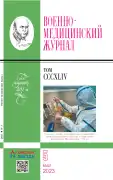On the risk factors for acute kidney injury in myocardial infarction in military personnel
- Authors: Gordienko A.V.1, Sotnikov A.V.2, Tasybaev B.B.2, Nosovich D.V.2
-
Affiliations:
- The S.M.Kirov Military Medical Academy of the Ministry of Defense of the Russian Federation
- The S.M.Kirov Military Medical Academy of the Ministry of Defense of the Russian Federation
- Issue: Vol 344, No 5 (2023)
- Pages: 43-47
- Section: Treatment and prophylactic issues
- URL: https://journals.eco-vector.com/0026-9050/article/view/630061
- DOI: https://doi.org/10.52424/00269050_2023_344_5_43
- ID: 630061
Cite item
Abstract
The influence of various factors on the risk of developing acute kidney injury in myocardial infarction in military men was assessed to improve prevention opportunities. The study included 502 patients under 60 years of age with verified type I myocardial infarction, 12 (2.4%) of whom were diagnosed with acute kidney injury. The following factors had a significant impact on the risk of developing acute kidney injury: unstable angina pectoris, arterial hypertension with a crisis course with a frequency of hypertensive crises more than once a month, no history of excess body weight, heart rate less than 64 per minute, left ventricular myocardial mass index 158.2 g/m2 or more, its ejection fraction is 60.6% or more, stroke volume is 79.4 ml or more, its late filling rate in diastole is 0.8 cm/s or more, total pulmonary resistance is less than 290.1 dyne×s×cm-5, serum sodium level 144 mmol/l and more in the first hours of the disease. Combinations of these factors show the risk of developing acute kidney injury in military personnel with myocardial infarction, which must be considered preventing this complication.
About the authors
A. V. Gordienko
The S.M.Kirov Military Medical Academy of theMinistry of Defense of the Russian Federation
Author for correspondence.
Email: vmeda-nio@mil.ru
заслуженный врач РФ, профессор, полковник медицинской службы в отставке
Russian Federation, Saint PetersburgA. V. Sotnikov
The S.M.Kirov Military Medical Academy of the Ministry of Defense of the Russian Federation
Email: vmeda-nio@mil.ru
доктор медицинских наук, полковник медицинской службы
Russian Federation, Saint PetersburgB. B. Tasybaev
The S.M.Kirov Military Medical Academy of the Ministry of Defense of the Russian Federation
Email: vmeda-nio@mil.ru
майор медицинской службы
Russian Federation, Saint PetersburgD. V. Nosovich
The S.M.Kirov Military Medical Academy of the Ministry of Defense of the Russian Federation
Email: vmeda-nio@mil.ru
кандидат медицинских наук, капитан медицинской службы
Russian Federation, Saint PetersburgReferences
- Авдошина С.В., Ефремовцева М.А., Виллевальде С.В., Кобалава Ж.Д. Оценка риска развития острого повреждения почек у больных с острой сердечно-сосудистой патологией без инвазивного вмешательства // Кардиология. – 2019. – Т. 59, № 12S. – С. 46–56. https://doi.org/10.18087/cardio.n466
- Бельских А.Н., Галагудза М.М., Голота А.С. и др. Нановезикулярная терапия. Эволюция концепции, современное состояние и перспективы. Сообщение 1. Нановезикулярная терапия острого повреждения почек // Воен.-мед. журн. – 2018. – Т. 339, № 2. – С. 60–66.
- Кардиоваскулярная профилактика 2017. Российские национальные рекомендации // Рос. кардиол. журн. – 2018. – Т. 23, № 6. – С. 7–122. doi: 10.15829/1560-4071-2018-6-7-122
- Кудинова А.Н., Гордиенко А.В., Сотников А.В. и др. Ранние маркёры легочной гипертензии у мужчин молодого и среднего возраста после перенесенного инфаркта миокарда // Вестн. Рос. воен.-мед. акад. – 2019. – № 3 (67). – С. 30–33.
- Сотников А.В., Гордиенко А.В., Чинь Ван Нхан и др. Особенности кардиоваскулярных факторов риска у мужчин моложе 60 лет с острым повреждением почек при инфаркте миокарда // Мед.-фарм. журн. «Пульс». – 2020. – Т. 22, № 4. – С. 120–127. doi: 10.26787/nydha-2686-6838-2020-22-4-120-127
- Тришкин Д. В., Серговенцев А. А., Долгих С.В. и др. Организация системы профилактики заболеваний органов кровообращения у военнослужащих Вооруженных Сил, их лечения и медицинской реабилитации // Воен.-мед. журн. – 2021. – Т. 342, № 11. – С. 4–15. doi: 10.52424/00269050_2021_342_11_04
- Черкашин Д.В., Макиев Р.Г., Кириченко П.Ю. и др. Новая стратегия повышения эффективности профилактики сердечно-сосудистых заболеваний в Вооруженных Cилах Российской Федерации // Вестн. Рос. воен-мед. акад. – 2017. – Т. 19, № 3. – C. 34–39. doi: 10.17816/brmma12178
- Auer J., Verbrugge F.H., Lamm G. Editor’s Choice – What do small serum creatinine changes tell us about outcomes after acute myocardial infarction? // Eur. Heart. J. Acute Cardiovasc. Care. – 2018. – Vol. 7, N 8. – P. 739–742. doi: 10.1177/2048872617728721
- Costanzo M.R. The Cardiorenal Syndrome in Heart Failure // Heart Fail. Clin. – 2020. – Vol. 16, Jss.1. – P. 81–97. doi: 10.1016/j.hfc. 2019.08.010
- El-Ahmadi A., Abassi M.S., Andersson H.B. et al. Acute kidney injury – A frequent and serious complication after primary percutaneous coronary intervention in patients with ST-segment elevation myocardial infarction // PLoS One. – 2019. – Vol. 14, N 12. – e0226625. doi: 10.1371/journal. pone.0226625
- Kaltsas E., Chalikias G., Tziakas D. The Incidence and the Prognostic Impact of Acute Kidney Injury in Acute Myocardial Infarction Patients: Current Preventive Strategies // Cardiovasc Drugs Ther. – 2018. – Vol. 32, N 1. – P. 81–98. doi: 10.1007/s10557-017-6766-6
- Lewicki M., Ng I., Schneider A.G. HMG CoA reductase inhibitors (statins) for preventing acute kidney injury after surgical procedures requiring cardiac bypass // Cochrane Database Syst. Rev. – 2015. – N 3. – CD010480. doi: 10.1002/14651858.CD010480.pub2
- Silver S.A., Chertow G.M. The Economic Consequences of Acute Kidney Injury // Nephron. – 2017. – Vol. 137, N 4. – P. 297–301. doi: 10.1159/000475607
- Thygesen K., Alpert J.S., Jaffe A.S. et al. Task Force for the Universal Definition of Myocardial Infarction. Fourth Universal Definition of Myocardial Infarction (2018) // Glob Heart. – 2018. – Vol. 13, N 4. – P. 305–338. doi: 10.1016/j.gheart.2018.08.004
- Wilson A.S., Watts J.A., Bush K.N.V. Active Duty Personnel With ST Elevation Myocardial Infarctions Are Deployment Ineligible Despite Receiving Standard Management // Mil. Med. – 2020. – Vol. 185, Jss. 5–6. – P. e638–e642. doi: 10.1093/milmed/usaa026
Supplementary files






